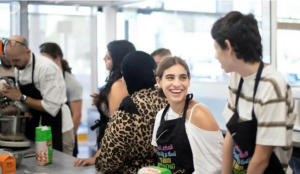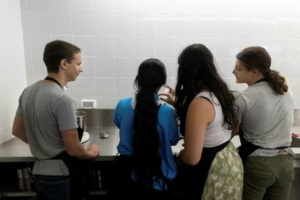At an Israeli-Palestinian summer camp, right-wing threats only strengthen the bond

Campers in a joint cooking class at the summer camp held by the Parents Circle, July 2023
Shira Kadari-Ovadia reports in Haaretz on 31 Jul 2023:
Early last week, one of the buildings of the Ben Shemen Youth Village was filled with standard-issue equipment for summer camp – jerrycans, chess sets, mats, boxes of chocolate spread, sliced bread and cookies. Wide-eyed boys and girls slowly emerged from the dormitory-turned-bunks on their way to the dining room, wishing each other a good morning. From there, they made their way to the day’s first group activity.
At first glance, this looks like any other summer camp. But this one is anything but: It is sponsored by the Parents Circle-Families Forum, an organization of Palestinian and Israeli families who have lost family members in the conflict. The doors to the campers’ rooms are decorated with their names i
This year is the 10th for the summer camp. Some 50 teenagers from both sides of the Green Line come for a week of shared activities. Several of them belong to bereaved families who are part of the Parents Circle-Families Forum, and the rest found their way there through other paths.
The Palestinian campers from the West Bank have always needed to get permits to enter Israel, but this year, for the first time, it was uncertain whether the camp would open at all. At the end of May, the regular group of teens living and learning at Ben Shemen was notified that the summer camp would be using the facilities. From there, word got out to right-wing activist Shai Glick, who swiftly sent letters to the education minister, right-wing Knesset members and the media to complain.
The right-wing media swooped in. Channel 14 claimed that Ben Shemen worked “behind the backs of parents” when it decided to rent its facilities to the camp over the summer. Arutz Sheva hinted that the camp’s activities were illegal. Right-wing MKs called an urgent meeting of the Education, Culture and Sports Committee to discuss the matter.
During the deliberations, which were held in June, MK Hanoch Milwidsky of Likud threatened the director of Ben Shemen: If she didn’t cancel the contract with the camp “we’ll make sure to carefully look into the public funds you get.” Otzma Yehudit MK Almog Cohen threatened to “blow up the camp.”
Cohen never made good on his threat, but the verbal attacks left their mark on the Ben Shemen administration, which was very hesitant about letting journalists onto its campus. The Parents Circle-Families Forum was also on edge. They have gotten used to constant attacks from the right and efforts to block the organization’s events from taking place, such as the annual joint Israeli-Palestinian Memorial Day ceremony and meetings organized at schools by the group, but Cohen’s threat of violence marked a new level of vitriol.
But a few days after the camp had opened for the summer, it became clear that the threats issued at the Education Committee meeting were mere words, and the tensions eased.
The camp’s daily schedule is divided in two: fun experiences, like trip to the water park or cooking classes during the day, and discussions on weighty topics in the evenings. “Afterward, at night, they get together in the club room for karaoke. For whatever reason, they always end up singing Disney songs,” says Tamar Shamir, the camp’s coordinator.

Campers in the 2022 camp
In the activity room, counselors Shaima and Neta lead a game to help the 14- and 15-year-old campers get to know each other better. Shaima did so in Arabic and Neta in Hebrew, with a translator explaining the rules. Each camper said their name, accompanied by a gesture of their choice, to be repeated by the camper whose turn followed. Rona hopped in place, Aseel clapped, Amar stomped his feet.
Even though it was already the camp’s third day, the two groups of teens stood separately: Palestinians on one side of the circle, Israelis on the other. But Neta and Shaima were determined to bring them closer together: They took out a ball, and encouraged the campers to say the name of someone in the group they didn’t know yet and pass them the ball. At first, the ball moved slowly and hesitantly from camper to camper, before gradually picking up speed.
Even though everyone who enrolls at the camp does so knowing they will be encountering the “other side,” that encounter isn’t always a smooth one. The evening before, two Parents Forum’s members, an Israeli and a Palestinian, talked to the campers, followed by a group discussion. “It seemed that the Israeli woman’s story had no effect on [the Palestinians]. One said, ‘I didn’t care,'” said one of the Israeli girls, “It annoyed me – where is your empathy towards us?” Her friend Inbar added that it was this harsh reaction that made her “want to make them understand us, too.”
The Israeli campers concede that their knowledge of the other side is limited, in some cases doesn’t exist at all. “At school, they don’t teach us about what’s happening there at all,” says Yuval. “Until I got here, I didn’t know what the army does to Palestinians.”
Although the discussion left them pondering the chasm between the two different perspectives, when asked if there was a chance for true friendship between the two sides, they all say yes, without hesitation. “After the discussion circle was over, we sat around until 1 in the morning and talked. There’s a lot to talk about,” she says.
The girls were all aware of the media storm surrounding the camp this year. “I’m the kind of person who gets worked up about these things – the issue in the Knesset scared me. When a Knesset member says he’s going to blow up the summer camp, it’s not fun,” says Nina (who preferred to use a pseudonym). “But I never thought I wouldn’t come because of that.”
Inbar adds that “what they said outside about the camp didn’t have much of an effect – the fact is that we’re all here.”
Khaled, an 18-year-old who has been coming to the camp for several years, said that “In the beginning, it’s a little difficult to hear the other side’s narrative.” He declined to use his real name out of fear of being attacked by Palestinians. He added that those who come back each year learn to form friendships with “the other side,” and that the conversation gradually becomes easier.
“Coming here is an eye-opening experience,” he says in fluent English, “Before that it was ‘the army,’ ‘the settlers,’ – I didn’t know there were Israelis who cared about human rights. After coming here, I can say that there are good and bad people in every community. After four years at the Forum’s camp, it undoubtedly brought me closer to the Israeli participants and helped both sides understand each other.”
Sometimes, mutual understanding develops into real friendships, like the one between Khaled and 17-year-old Yonatan. Yonatan said he was born into a “right-wing religious family” and gradually began to discover “his truth: veganism, atheism and peace.” He heard about the Forum for the first time through his school, which invited the organization’s members for a dialogue. “Some of the students in the class were interested, some weren’t, some were opposed. It had an effect on me,” he said.
He and Khaled keep their friendship, which includes a mutual fondness for “dad jokes,” going during the year via WhatsApp and Zoom. Their common denominator of being atheists growing up in religious families also helps them stay close. “It’s not always easy to understand the other side, but the least you can do is listen,” said Khaled.
This article is reproduced in its entirety
